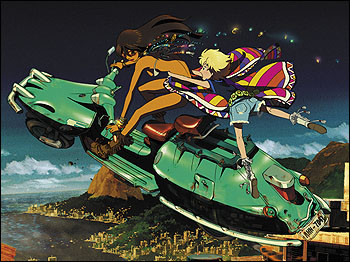Not a Review: Michiko and Hatchin

Michiko and Hatchin at first caught my attention due to its rather obvious, but at the same time tenuous-at-best connection to one of my all time favourites, Cowboy Bebop. Initial promotional materials were peppered with western influence, and the production studio behind it all–Manglobe–had made Samurai Champloo in the past, another work by Watanabe Shinichiro. Further more, Watanabe Shinichiro’s name was in the initial staff list for Michiko and Hatchin, except for this time under the vague title of “music producer.” The actual listed director was a complete newbie.
Despite these mixed messages put out by the show before it even started airing, I went into Michiko and Hatchin with fairly high expectations. Were they met? Almost, I guess.
Straight from the get-go, Michiko and Hatchin advertises itself as a crazy action series set in South America. However, when the credits roll at the end of each episode, I can’t help but notice that this expectation is horribly betrayed. Michiko and Hatchin is not an action show. Michiko and Hatchin has action, but it is not an action show. Michiko and Hatchin is drama about a mother and child trying to survive. To complicate matters, the adult acts more childish than the child, and the child is more mature that the adult. They often argue, and in the midsts of all this they meet people, gain friends along with enemies, all while searching for one man who the both of them barely know.
Even though Michiko and Hatchin betrays one’s expectations episode after episode, it’s not really a bad thing. While director Yamamoto Sayo is a newbie, his work here shines at certain moments. Other times it falls flat, but on the whole it’s an honest effort. The writing also tends to be frighteningly dark and bleak, free of the rather typical hopeful themes that are prevalent across anime. However, the show also has its fair share of light moments to balance it all out.
The actual entertainment value between episodes varies. There are times when episodes are pulled of with a sharp sense of professionalism and skill, and times when episodes feel a touch lazy. Nothing is flat-out bad, but it’s uneven. The actual animation quality manages to stay fairly consistent, but some episodes near the end start to look somewhat rushed.
One area where the show really shines is in the music department, which is no real surprise with Watanabe as “music producer.” While not all tied to a specific genre, each and every piece of background music more or less works with the scene it’s accompanied with, and are all of consistently of high quality. The opening song in particular is quite nice, and is a perfect match for the bright and vibrant opening animation.
Michiko and Hatchin is clearly a work of love–anime is dead in America, and this kind of stuff just doesn’t sell in Japan–so it really has a lot of spirit going for it. However, execution is at times sloppy, and in the end I feel as if I didn’t get what the show promised me initially. It’s a fine piece of work–and I would recommend it to any casual anime fans–but I’m not sure if I’d watch it again as of yet.
Completed the series a bunch of weeks (months?) ago… I really liked it. It was different from most of the anime I’ve seen. ^^